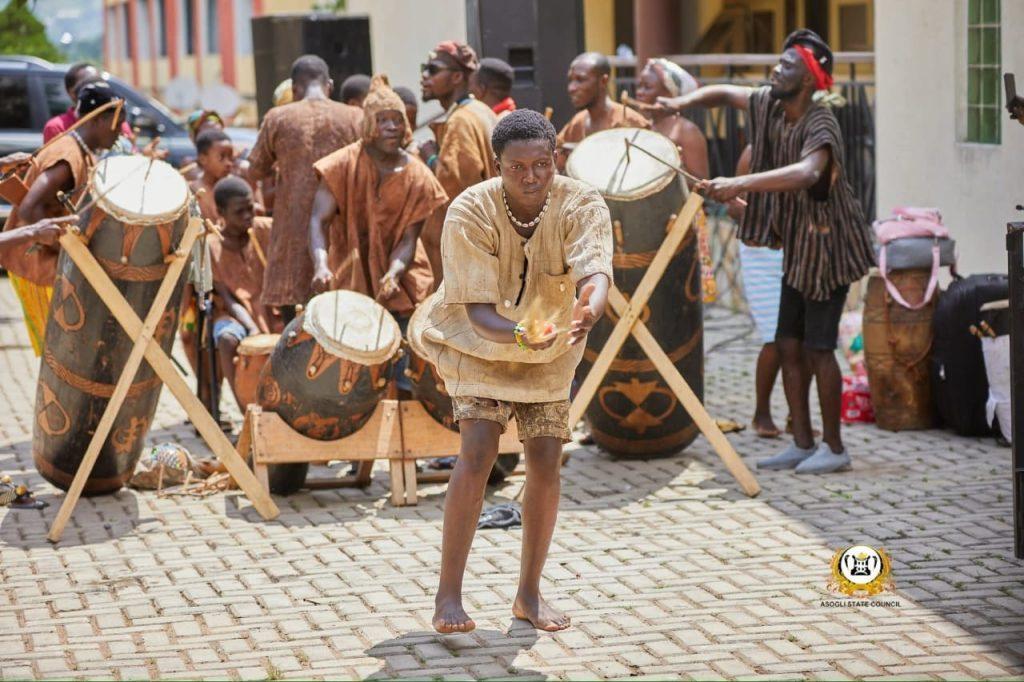Africa-Press – Ghana. This year’s celebration Asogli Teza festival has officially been launched in Ho, with a showcase of arts and culture and emphasising their role national cohesion, identity preservation and socio-political transformation.
The event, held on July 14, 2025, in Ho, was steeped in the cultural wealth of the Asogli State, presenting a vibrant tapestry of Ewe tradition woven into the national narrative of unity and purposeful development.
The festival will be celebrated on the Together in Honesty and Purpose, We Build a Just, Peaceful, Prosperous Nation,” and the theme resonates profoundly within the aesthetics and cultural elements showcased at the festival launch.
Every display from the rhythm of the drums to the dignity of the royal regalia was not just a performance, but a coded message on the values of truth, peace, justice, and collective identity.
The ceremony transformed art into a civic message, and culture into a vessel for ethical renewal.
Mr. James Gunu, the Volta Regional Minister, described the festival as “a rallying point for development and social cohesion.”
He reinforced the idea that culture, when appropriately harnessed, functions as a soft power in the pursuit of peacebuilding, civic education, and democratic growth.
In appreciating the arts, one must first note the symbolism embodied in the colourful display of traditional attire, the kente, batakari, and hand-woven fabrics worn by chiefs, performers, and community members alike.
These garments are not merely decorative. They are carriers of philosophy, clan identity, and ancestral knowledge. Their prominence at the launch attests to a deliberate reclaiming of indigenous expression as central to modern public life.
The performances by groups such as the Asogli Asafo, Kekeli Cultural Group, and Ho Bankoe Zibo Group served as living archives of heritage, capturing in dance and drum the historical experiences of migration, conflict, reconciliation, and community bonding.
These acts, rooted in oral tradition, remind audiences that cultural knowledge remains a dynamic process, constantly renewed through intergenerational participation.
Importantly, the launch event did not present culture as static nostalgia, but as a framework for critical engagement with the present.
Through the aesthetic excellence of the arts on display, the people of Asogli called attention to the need for a peaceful and just society, where purpose, integrity, and service are the core pillars of governance and development.
Togbe Adzie Lãkle Howusu, Divisional Chief of Ho-Dome, observed that the unity and cultural pride among the youth echoes a vital educational message.
By situating the youth at the centre of cultural transmission, the Asogli State reaffirms its investment in sustainability, moral discipline, and social responsibility all necessary virtues for nation-building under the banner of honesty and purpose.
The event, which took place at a civic location like the GNAT Hall, further symbolised the convergence of traditional leadership, state institutions, and the public in a shared space of cultural diplomacy.
At the launching were stakeholders from across the region, chiefs, queens, government officials, corporate actors, and security services, and this created a multidimensional dialogue on development through the lens of culture.
In appreciating the ceremony’s visual and performative richness, one must also commend the organisational detail, choreography, and coordination that went into creating such an immersive experience. The launch balanced solemn tradition with modern event management, demonstrating that cultural celebration can be both ancient in form and contemporary in execution.
Moreover, the linguistic, musical, and visual expressions on display affirm that the arts are not marginal to society but central to the construction of meaning, values, and collective aspirations.
The themes embedded in the dance steps, the drum language, and the symbolic artefacts form a unique grammar of cultural advocacy.
The arts, as demonstrated at the Asogli Teza launch, are instruments for social dialogue and participatory governance. They help communities to articulate grievances, celebrate achievements, and imagine futures anchored in justice, peace, and prosperity. In this sense, the event was both a cultural showcase and a civic classroom.
As the launch sets the tone for the full celebration in September, it invites Ghanaians to see festivals not merely as tourist attractions, but as strategic platforms for cultural diplomacy, youth mentorship, and moral reflection.
The fusion of aesthetics with purposeful messaging at this launch must be studied, replicated, and scaled across the country.
For More News And Analysis About Ghana Follow Africa-Press







